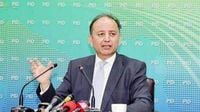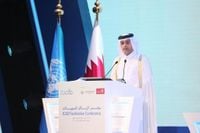Islamabad: Federal Minister for Climate Change and Environmental Coordination, Senator Musadik Masood Malik, reaffirmed Pakistan’s unwavering commitment to the United Nations Sustainable Development Goals (SDGs) on Thursday, April 17, 2025. Chairing a high-level meeting with a five-member delegation from UNDP-Pakistan, led by Country Representative Samuel Rizk, the minister emphasized that the SDGs are not just aspirational goals but practical tools that guide countries in building resilient economies, protecting natural ecosystems, and securing a better quality of life for current and future generations.
During the meeting, held in Islamabad, discussions focused on Pakistan’s progress toward key SDGs, including climate action, environmental protection, education, health, and gender equality. Senator Malik stressed that these goals provide a clear roadmap to tackle interconnected challenges like climate change, environmental degradation, and social inequality. “In Pakistan, these goals are central to our climate policy and development agenda,” he stated.
Malik highlighted the need for multi-sector collaboration, involving government, civil society, the private sector, academia, and international partners, to ensure meaningful progress. “Pakistan is fully committed to inclusive and transparent processes in achieving SDG targets, leaving no one behind in our journey toward sustainability,” he added.
As one of the world’s most climate-vulnerable nations, Pakistan faces urgent challenges that require strategic investments in clean energy, climate-smart agriculture, sustainable urban development, and ecosystem restoration. The minister underscored these areas as key priorities for building resilience against climate shocks.
Secretary of the Ministry of Climate Change and Environmental Coordination, Aisha Humera Moriani, briefed the meeting on ongoing initiatives supported by national and international organizations to advance SDG-related objectives, particularly in climate action, water conservation, health, and environmental protection. “Our ministry is working closely with partners to align climate strategies with the SDGs, ensuring environmentally sound and socially equitable development,” Moriani stated.
During the session, UNDP’s Samuel Rizk presented an overview of Pakistan’s progress on several key SDGs, reaffirming UNDP’s ongoing support for Pakistan’s development agenda. He expressed appreciation for the ministry’s proactive engagement in addressing these critical issues.
The meeting culminated in discussions about potential future initiatives in agriculture, waste-to-energy conversion, renewable energy, transportation, and green industry. Both sides agreed to strengthen collaboration in these sectors to support Pakistan’s goals of environmental sustainability and climate resilience.
Future collaborations were also discussed, with both sides agreeing to boost joint initiatives in key areas such as green industry, waste-to-energy, sustainable transportation, and smart agriculture, in pursuit of a climate-resilient and sustainable Pakistan.
Senator Malik emphasized that achieving meaningful progress requires a collective effort beyond government institutions. “Civil society, the private sector, academia, and global development partners must work together to meet these targets. Our approach is inclusive and transparent—no one should be left behind,” he said.
The discussions at this high-level meeting reflect Pakistan’s ongoing efforts to align its climate and development policies with the global SDG framework. As the country continues to grapple with the impacts of climate change, the commitment to the SDGs serves as a guiding principle for sustainable development.
In conclusion, Pakistan’s proactive stance on the SDGs not only demonstrates its commitment to addressing climate change but also highlights the importance of inclusive development strategies that involve all sectors of society. The collaborative efforts between Pakistan and UNDP signify a promising step towards achieving a sustainable future.








